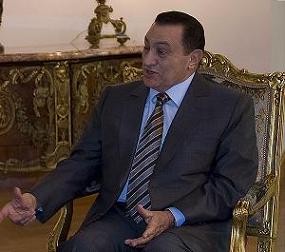In a phenomenal op-ed in The New York Times, titled “A Peace Plan Within Our Grasp,” Egyptian President Hosni Mubarak spoke out for peace.
So often we see the Arab-Israeli conflict as a huge, interminable, monolithic fight. With 2 sides, neither of which ever hears the other. But this was different.
Here is an Arab leader – president of one of the greatest and most powerful of the Arab states – who gets it.
Lord knows Mubarak has enough to contend with at home. He can play the populist card to his people, and bash “the Zionists” and “the Jews” ’till the cows come home.
But he did not. Like his predecessor Anwar Sadat before him, here is a leader who is great enough (for all his flaws) to stand up, and speak the truth. And does this man ever get the truth.
Mubarak speaks of the “dream of a permanent peace in the Middle East” and of his “hopes for peace.”
He lays the challenges out on the line, acknowledging that
The biggest obstacle that now stands in the way of success is psychological: the cumulative effect of years of violence and the expansion of Israeli settlements have led to a collapse of trust on both sides. For the talks to succeed, we must rebuild trust and a sense of security.
He isn’t apportioning blame (though there is certainly blame a-plenty to go around). He isn’t playing games. He just goes out there and calls out the lack of trust, which is so central to the challenge of resolving this conflict.
And then he speaks of the steps that must be taken, calling out that
First, we must safeguard the peace process from further outbreaks of violence.
And also raising the crucial point that
For an Israeli-Palestinian peace to succeed, it must also be embedded in a broader regional peace between Israel and the Arab world. …
Arab nations should continue to demonstrate the seriousness of their peace initiative with steps that address the hopes and concerns of ordinary Israelis.
Finally, President Mubarak addressed the question of security, saying
For both sides trust can be built only on tangible security. …
I recognize that Israel has legitimate security needs…
It is truly a very important moment when an Arab leader publicly acknowledges so many of Israel’s most basic concerns, and truly demonstrates his understanding of the Israelis’ needs and worries. I can only hope that his leadership will allow him to bring this understanding to the rest of the Arab world, in the cause of peace and security for all in the region.
President Mubarak closes by saying
We live in a world that is suffering from the bitter lash of extremism. A permanent peace between Israel and the Palestinians would bring the light of hope to the Middle East and to people everywhere. As someone who has witnessed both the ravages of war and the hope for peace, I appeal to all sides to make this new round of negotiations the one that succeeds.
I, for one, am certain that we all can join him wholeheartedly in this sentiment.
(Photo: US Department of Defense)





Question: if Palestinian refugees return to Israel’s pre-1967 borders, won’t they soon outnumber the Jewish Israelis living there? If there is supposed to be a two-state solution, why couldn’t the refugees return to the Palestinian state?